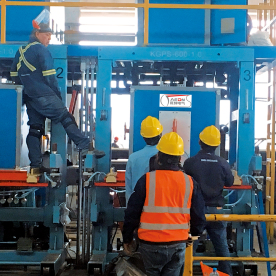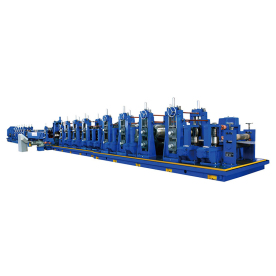In the ever-evolving landscape of modern manufacturing, technological advancements have paved the way for more efficient and precise methods of heating materials. Among these innovations, automatic induction heating equipment has emerged as a game-changer, offering numerous benefits over traditional heating methods. From electrical conductivity to process automation, this technology is reshaping industries, enhancing productivity, and promoting energy efficiency.
Induction heating technology operates on the principle of electromagnetic induction, where an alternating current passes through a coil, generating a rapidly changing magnetic field. This magnetic field induces eddy currents in conductive materials, leading to heat generation within the material itself. This method not only provides a more uniform heating experience but also allows for precise temperature control, making it ideal for various applications, including forging, welding, brazing, and annealing.

Revolutionizing Industries: The Role of Automatic Induction Heating Equipment in Modern Manufacturing Processes
One of the most significant advantages of automatic induction heating equipment is its ability to enhance productivity. Traditional heating methods, such as gas or resistance heating, often require a longer heating time and can lead to uneven heating, resulting in inconsistent product quality. With automatic induction heating equipment, manufacturers can achieve faster heating cycles, reduced processing times, and increased throughput. This efficiency allows businesses to meet tighter production schedules without sacrificing quality, ultimately resulting in higher profit margins.
Moreover, automatic induction heating equipment can be designed to integrate seamlessly into existing manufacturing systems. With smart technology and automation features, operators can monitor and control the heating process remotely, ensuring consistent results while minimizing human intervention. This capability not only enhances operational efficiency but also reduces the potential for operator error, leading to improved safety within the workplace. Automated systems can also provide real-time data analytics, allowing manufacturers to track performance metrics, optimize operational parameters, and make informed decisions based on historical data.

Revolutionizing Industries: The Role of Automatic Induction Heating Equipment in Modern Manufacturing Processes
Energy efficiency is another hallmark of automatic induction heating equipment. Traditional heating methods often waste energy, as heat is generated externally and then transferred to the workpiece. In contrast, induction heating generates heat directly within the material, significantly reducing energy consumption and heat loss. This efficiency not only contributes to lower operational costs but also aligns with sustainability initiatives, making it an attractive option for environmentally conscious manufacturers. As energy prices continue to rise and regulations around carbon footprints tighten, businesses that invest in induction heating technology will likely find themselves better positioned for the future.
Furthermore, the versatility of automatic induction heating equipment makes it applicable across a wide range of industries, from aerospace and automotive to medical device manufacturing. In the aerospace sector, for example, induction heating can be used during the fabrication of critical components, such as turbine blades, where precision and reliability are paramount. In automotive manufacturing, induction heating is employed in processes like hardening and tempering, helping to produce high-performance parts that can withstand the demands of modern vehicles.
As industries continue to embrace new technologies, the demand for automatic induction heating equipment is expected to grow. Manufacturers are not only looking for ways to improve their existing processes but also seeking innovative solutions that will keep them competitive in a global market. The integration of advanced features such as artificial intelligence and machine learning into automatic induction heating systems is likely to provide further enhancements, unlocking new levels of efficiency and process optimization.

Revolutionizing Industries: The Role of Automatic Induction Heating Equipment in Modern Manufacturing Processes
In conclusion, automatic induction heating equipment represents a transformative technology that offers significant benefits to modern manufacturing. Through enhanced productivity, improved energy efficiency, automation capabilities, and versatility across various industries, this technology is set to redefine how heating processes are conducted. As manufacturers continue to explore the possibilities of induction heating, they will undoubtedly find new ways to innovate, streamline operations, and achieve sustainable growth. Whether you’re a small business looking to improve your production capabilities or a large manufacturer seeking to maintain a competitive edge, investing in automatic induction heating equipment might just be the solution you need to revolutionize your manufacturing processes.Automatic Tube making machine



